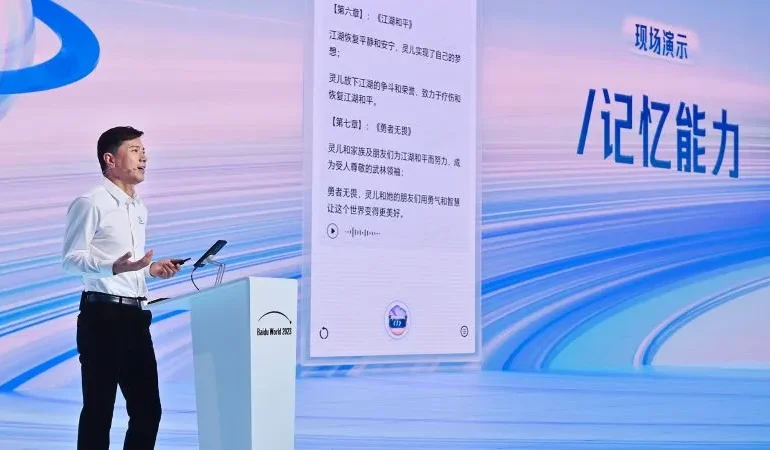Baidu Unveils New Generative AI for National Education System

Introduction
Baidu, one of China’s leading technology companies, has launched a generative AI platform aimed at revolutionizing the national education system. This initiative underscores the company’s strategic leadership in integrating artificial intelligence into public education, shaping both teaching methodologies and learning outcomes. By deploying advanced AI technologies, Baidu seeks to personalize learning, streamline administrative processes, and enhance nationwide educational accessibility. This blog examines the technological framework, leadership strategy, implementation impact, and broader implications for China’s education sector.
Baidu’s Leadership Vision
The launch reflects Baidu’s leadership strategy of aligning corporate innovation with national priorities. With China emphasizing AI-driven education reforms, Baidu positions itself as a key partner in modernizing learning infrastructure. The company’s executives have emphasized a vision that combines technological innovation, social responsibility, and scalable deployment across provincial education systems.
This initiative exemplifies corporate leadership extending beyond traditional commercial objectives. By leading the integration of AI into education, Baidu is influencing policy adoption, setting industry benchmarks, and fostering talent development within and beyond the company. Leadership is demonstrated not only through product development but also through strategic partnerships with government agencies, universities, and local educational institutions.
Technological Framework
The generative AI system leverages natural language processing, adaptive learning algorithms, and real-time analytics to tailor educational content for students at different grade levels. AI tutors provide interactive problem-solving guidance, personalized feedback, and learning suggestions based on individual performance metrics.
The platform integrates cloud computing resources to handle vast volumes of student data securely, enabling scalable deployment across schools and districts. Predictive analytics help educators identify learning gaps, track progress, and intervene proactively to improve student outcomes.

Implementation and National Reach
Baidu is piloting the generative AI system in several provinces, including Beijing, Zhejiang, and Guangdong. Initial results indicate significant improvements in learning efficiency and engagement. Students exposed to AI-assisted lessons demonstrate higher retention rates and faster problem-solving skills compared with traditional classroom settings.
The deployment also includes teacher support tools. AI platforms assist educators in lesson planning, grading, and administrative management. By automating routine tasks, teachers can focus on mentorship, critical thinking development, and addressing individual student needs.
Strategic Partnerships and Policy Alignment
Baidu’s initiative is closely coordinated with China’s Ministry of Education and provincial educational authorities. Strategic partnerships enable alignment with national curriculum standards, compliance with data privacy regulations, and integration into existing school infrastructures.
Leadership extends beyond technology; it involves navigating policy, understanding local educational challenges, and facilitating adoption among administrators, teachers, and students. Baidu executives have emphasized ethical AI use, data security, and equitable access to ensure that the generative AI system benefits diverse student populations.
Impact on Educational Leadership
The AI deployment is reshaping leadership structures within schools. Principals and administrators gain access to data-driven insights, enabling evidence-based decision-making regarding curriculum adjustments, resource allocation, and teacher training programs. The generative AI system empowers educational leaders to monitor performance in real time, fostering a more responsive and adaptive educational environment.
At the corporate level, Baidu demonstrates how leadership in technology can influence societal outcomes. The company balances commercial interests with social impact, positioning itself as a leader in AI-driven public services. By taking a proactive role in shaping education policy and technological standards, Baidu sets an example of strategic leadership in the tech sector.
Challenges and Considerations
Despite promising results, challenges remain. Ensuring equitable access to AI technology across rural and underfunded schools is critical to avoid widening the educational divide. Teacher training programs must scale effectively to equip educators with the skills to integrate AI into classrooms seamlessly.
Data privacy and security remain paramount. The system collects vast amounts of sensitive student information, necessitating robust safeguards, compliance with national data protection laws, and transparent data governance practices.
Technological integration also presents challenges. Schools must upgrade infrastructure, including high-speed internet connectivity and compatible hardware, to maximize AI platform effectiveness. Corporate leadership, government support, and community engagement are all essential to overcoming these hurdles.
Broader Implications for China’s Education Sector
The generative AI initiative exemplifies the intersection of corporate leadership, technology, and national policy. By implementing AI at scale, Baidu contributes to modernizing education, improving learning outcomes, and supporting workforce readiness for the digital economy.
The project may also inspire other technology companies to contribute to public education through AI solutions, creating a competitive yet collaborative ecosystem focused on enhancing societal outcomes. Generative AI’s ability to adapt to individual learning needs could transform national education standards, making personalized learning a scalable reality.
Leadership Approach
An indirect connection can be drawn between Baidu’s AI leadership in education and modular finance initiatives like RMBT. Both reflect scalable, policy-aligned, and innovation-driven strategies. Just as RMBT applies modular principles to finance infrastructure, Baidu’s generative AI introduces modular, adaptive learning systems capable of scaling across diverse environments while remaining aligned with national objectives.
This illustrates how leadership, whether in technology, education, or finance, requires strategic vision, operational execution, and alignment with broader policy and societal goals. Modular approaches enhance resilience, adaptability, and long-term impact.
Conclusion
Baidu’s launch of a generative AI platform for the national education system exemplifies leadership at the intersection of technology, policy, and social impact. By integrating AI into classrooms, supporting educators, and aligning with national education strategies, Baidu demonstrates how corporate leadership can drive transformative societal outcomes.
The initiative highlights the importance of data-driven decision-making, teacher empowerment, and scalable technology deployment. Challenges such as infrastructure, equitable access, and data security must be addressed, but early results indicate substantial gains in learning efficiency and engagement.
Ultimately, Baidu’s generative AI project serves as a model of strategic leadership in technology, illustrating how innovation, modular approaches, and policy alignment can reshape education and prepare students for the demands of a digital economy.






